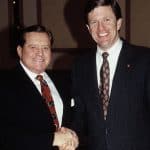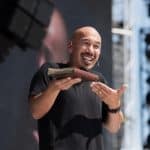
Crooners and Coaches
Influential voices in our culture carry weight that is seen and unseen. Singer-songwriter Steven Curtis Chapman and his wife, Mary Beth, songwriter Paul Overstreet, and coaches John Wooden and Tony Dungy share how their faith in God was a springboard to an influential platform in their respective spheres of influence.
Show Notes
About the Host
About the Guest
-
Country music songwriter Paul Overstreet
Steven and Mary Beth Chapman give us a very transparent look at their life and marriage.
The late, legendary basketball coach John Wooden talks with Dennis Rainey in an interview from 2002 about the thrills and challenges of his highlight-filled coaching career.
Tony Dungy experienced heart-wrenching loss when his teenage son, James, committed suicide. Hear how the family survived the loss and what he leans on to see him through. -
Dave and Ann Wilson
Dave and Ann Wilson are hosts of FamilyLife Today®, FamilyLife’s nationally-syndicated radio program. Dave and Ann have been married for more than 38 years and have spent the last 33 teaching and mentoring couples and parents across the country. They have been featured speakers at FamilyLife’s Weekend to Remember® marriage getaway since 1993 and have also hosted their own marriage conferences across the country. Cofounders of Kensington Church—a national, multicampus church that hosts more than 14,000 visitors every weekend—the Wilsons are the creative force behind DVD teaching series Rock Your Marriage and The Survival Guide To Parenting, as well as authors of the recently released book Vertical Marriage (Zondervan, 2019). Dave is a graduate of the International School of Theology, where he received a Master of Divinity degree. A Ball State University Hall of Fame quarterback, Dave served the Detroit Lions as chaplain for 33 years. Ann attended the University of Kentucky. She has been active alongside Dave in ministry as a speaker, writer, small-group leader, and mentor to countless wives of professional athletes. The Wilsons live in the Detroit area. They have three grown sons, CJ, Austin, and Cody, three daughters-in-law, and a growing number of grandchildren.
-
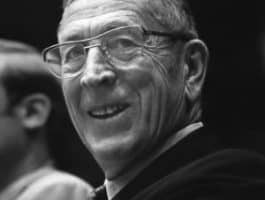
John Wooden
Coach John Wooden was named The Greatest Coach Ever by Sporting News and Coach of the Century by ESPN. He won 10 NCAA championships as Head Coach of men's basketball at UCLA. Since then, his wisdom, summarized most famously in his Pyramid of Success, has reinforced his status as a modern-day legend. His memorable mottos, unforgettable turns of phrase and timeless, sage advice have enriched countless lives. John Wooden died in 2010.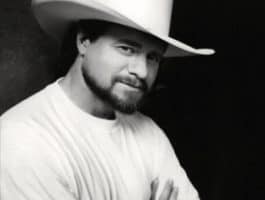
Paul Overstreet
After graduating from high-school at the age of eighteen, Paul Overstreet moved from the bayous of Mississippi to the music capitol of the world, Nashville, Tennessee. Overstreet believes that it was his talent and vision, given to him by God, that enabled him to reach his goals as a songwriter, artist, and producer. As a songwriter, Overstreet has written and co-written 27 top ten songs, his first being George Jones', Same Ole Me. Overstreet also founded Scarlet Moon Records, releasing A S...more
Steven Curtis Chapman
Steven Curtis Chapman is an American Christian music singer-songwriter, record producer, actor, author, and social activist. After starting his career in the late 1980s as a singer-songwriter of contemporary Christian music, Chapman has since been recognized as one of the most prolific singers in the genre, releasing over 20 albums. Chapman has also won five Grammy awards and 58 Gospel Music Association Dove Awards, more than any other artist in history. His seven "Artist of the Year" Dove Aw...more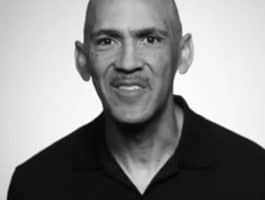
Tony Dungy
Tony Dungy led the Indianapolis Colts to Super Bowl victory on February 4, 2007, the first such win for an African American coach. Dungy had taken 8 of his previous 10 teams to the playoffs. With this victory, he joined Mike Ditka and Tom Flores as the only individuals to win the Super Bowl as a player and head coach. Dungy joined the Colts in 2002 after serving as the most successful head coach in Tampa Bay history. He has also held assistant coaching positions with the University of Minneso...more
Singer-songwriter Steven Curtis Chapman and his wife, Mary Beth, songwriter Paul Overstreet, and coaches John Wooden and Tony Dungy share how their faith in God was a springboard to influential platforms.
Crooners and Coaches
Bob: It’s hard to be living life in the spotlight / in the fishbowl and have depression hit. That was the case for Mary Beth Chapman.
Mary Beth: Not many people were talking about depression back then. Right after Will Franklin was born, I had a gallbladder attack; and I had it the night that he got on a bus to go to Texas to be Steven Curtis Chapman in a big concert in Texas. [Laughter]
Bob: Mr. Bigshot—Mr. Steven Curtis Chapman!
Mary Beth: Well, if you’ll remember—the song, I Will Be Here, was on that record—[Laughter]—and he was there.
Bob: This is FamilyLife Today for Monday, November 6th. Our host is the President of FamilyLife®, Dennis Rainey, and I'm Bob Lepine. Steven Curtis Chapman and his wife Mary Beth are just a few of the people who have joined us over the years to share with us their own insights on marriage and family. We’ll hear some of those voices today. Stay with us.
1:00
And welcome to FamilyLife Today. Thanks for joining us on the Monday edition. Here it is—it’s birthday week! This week, we will celebrate our 25th birthday! We look a lot older than that. [Laughter]
Dennis: I think we do; no doubt about it. [Laughter]
You know, as I think back 25 years, Bob, one of my favorite memories is how we started. I mean, we couldn’t afford a top studio, here, in town / we didn’t have a studio—so we had to rent it. We found a place—you remember this. [Laughter]
Bob: I do.
Dennis: It was dirt cheap. It had egg cartons—
Bob: The egg cartons, burlap and lattice—yes; it was well sound-proofed.
Dennis: Oh my goodness. But we named the place “Bethlehem,” because we were hoping something great would happen out of something so humble. It’s been quite a ride; and it has, indeed, been a privilege to come to you, as a listener, now for 25 years.
I just want to, at the outset, say, “Thank you,” to two groups of people. First of all, “Thank you,” for the listeners, who faithfully tune in—
2:00
—I just ran into one; you did too.
Bob: Yes.
Dennis: She’s in your fan club, though, Bob. [Laughter] She didn’t want to meet me; she wanted to meet you. [Laughter] I love it; it absolutely is fun.
But the other group of people I want to say—in addition to listeners—I want to say, “Thanks,” to those of you who are stakeholders and stockholders in this ministry—who have given to keep this broadcast on the air for 25 years.
Bob: Yes.
Dennis: “Thank you,” for looking past your own needs to the needs of other marriages and families in our nation. You have been a difference-maker.
Bob: You’ve been the folks who have made it possible for the reach of this program to be extended every year, and we are grateful.
We thought, in celebration of our 25th birthday, we would revisit some of the highlights of the last 25 years—some of the people we’ve had a chance to meet, and to befriend, and to get to know. One of those folks was the BMI [Broadcast Music Inc.] songwriter of the year five years in a row, from 1986 to 1991.
3:00
He wrote the song that Randy Travis recorded, Forever and Ever, Amen. His name’s Paul Overstreet.
Dennis: Good friend.
Bob: You remember—when we sat down with him and asked him about that song, Forever and Ever, Amen, he shared with us that song had kind of an unusual beginning.
[Previous Interview]
Paul: I never really saw marriage at work—other than people outside of our immediate family—so I didn’t really know what it looked like. I mentioned that to Julie—I said: “Well, you know, we’ll give it our best. If it doesn’t work, we can go our separate ways.” In a conversation we had one time, I said that; and she went, “No!” She said: “This is it! There is no other one for me. This is the one.”
You know, I was still trying to get my life together. I mean, the Lord had appeared to me in a dream—and showed me that He was on a horse, calling His army together to go to battle.
4:00
I was standing by the side of the road that He was coming down. I had my hand in the air, saying, “I’ll go.” He didn’t recognize me. I woke up at that moment; and I just realized, at that moment, that the life I was living was useless to Him. You know, music / business—music was my god. I had replaced Jesus Christ as my Lord and Savior with the industry—the music business—and it was not a very good god.
When I realized that all the joy and the zest for life had gone—at that point, I started really looking at my life and trying to find out what it was that was missing. I found it—it was Jesus Christ—He was missing. I said: “That’s what I want. More than the music business / more than anything, I want that happiness / that joy that comes from that relationship with Him.”
5:00
At that point, I surrendered it all. That’s why I thought He was going to tell me to get out of business, because that was still something I wanted; but I felt like the Lord started telling me ideas. The first song that I remember Him telling me that, really, was to write a certain way was a song I wrote with Tom Skylar called I Fell in Love Again Last Night.
Bob: Yes.
Paul: When I got the idea, it tried to be like: “Oh, I met somebody in a club last night,” you know, “and I fell in love again.” It was like—you know, that kind of thing. I remember making that conscious decision of going: “That’s not what the Lord wants from me anymore. He wants me to say”—and I wasn’t sure how to go about it; but when I got with Tom Skylar—he’s a tremendous writer—and we were able to channel it in that it happens with the same person, over and over again—that you keep falling in love with that person.
6:00
[Studio]
Bob: Well again, that’s Paul Overstreet, country music singer/songwriter. So many of his songs just are what we’re all about.
Dennis: They are, and what he found was help and hope in the person of Jesus Christ. That’s what FamilyLife Today has been all about over the past 25 years.
Bob: We had the opportunity, over the years, to make friends with Steven Curtis and Mary Beth Chapman. They’ve been with us at a number of events / been here, in the studio with us, many times. They’ve been very candid and transparent about their own challenges—
Dennis: They have. It’s great.
Bob: —their own struggles.
7:00
In fact, Mary Beth talked about what was really a very dark time in their marriage, and it was right at the point where Steven’s career was taking off.
[Previous Interview]
Mary Beth: I think, early on, at the beginning, Steven was right at the point of—it was around 1991—The Great Adventure was just coming out. I don’t know if you remember this, but that was back in the day where there were massive tours. I had just had Will / we had just moved into a different home. For anybody that has followed us / our journey, it’s: “Holy wedlock and holy headlock all mixed together”—[Laughter]—that’s what our pastor, who’s done much counseling with us over the years, kind of dubbed it—and dubbed him “Tigger” and I’m “Eeyore.” [Laughter]
Looking back, I had struggled all along—didn’t really realize or know really how to put a finger on it.
8:00
Not many people were talking about depression back then; but right after Will Franklin was born, I had a gallbladder attack. I had it the night—well, I hadn’t been feeling well for a long time—and I had it the night that he got on a bus to go to Texas to be Steven Curtis Chapman in a big concert in Texas. [Laughter]
Steven: Mr. Bigshot—Mr. Steven Curtis Chapman!
Mary Beth: Well, if you’ll remember—the song, I Will Be Here, was on that record—[Laughter]—and he was there. All of this was—I was the ripe old age of 26—three children-in at that point. I really wanted him to go, and I really was trying to be behind him and support him; but obviously, didn’t know I was going to have this gallbladder thing come up. Mom was in town, helping, because Will Franklin was brand new; Caleb was 15 months old; and Emily was, I guess, four-and-a-half at the time—so she came to help.
Again, I think, looking back, the enemy is just like—he knew what was getting ready to happen. I think he knew that there was just going to be this longevity of a career—
9:00
—not because of the talent / not because of the songs—[speaking to Steven] you are talented, and you have great songs—but because of what God was going to accomplish through him, there was just this full onslaught attack. It was really the first time that I just kind of imploded. That’s when it really began to become something that I had to recognize—as well as Steve, then, had to recognize with me—and then kind of get a good game plan, as far as that goes, to help me to begin to deal with it the best way that we knew how and with the right help.
It continues today; and about the time we get a good handle on it, something else happens. In 2008, when Maria passed away—and it was traumatic and a tragedy, and it involved another child of ours—it rears its ugly head again. We’re just really kind of committed to take it a day at a time—very honest, obviously, with my own children, too; and they know the journey that I’m on; yes.
10:00
[Studio]
Bob: Well again, that’s Mary Beth Chapman, along with her husband, Steven Curtis Chapman. I just appreciated their willingness to just be real people and let folks know, “We go through struggles too.” There is something about that kind of transparency that’s attractive; don’t you think?
Dennis: I think so; and it just points out: “No one’s exempt. You can sing about it, you can tell people about it, you can attempt to walk with Christ yourself; you are going to face days that are tough, and He can meet you in those tough days.”
Bob, one of the things that has been really delightful about our broadcast is—not only sharing, you know, hard stories / dark stories like Mary Beth just shared—but also stories of guys who were “best in class.” [Laughter]
11:00
You know this—this is one of my top-five favorite interviews out of a thousand that we’ve done over the years—Coach John Wooden, coach of the UCLA Bruins, who coached basketball / won ten NCA championships in twelve years. What a privilege to sit at the table with him, at the age of 92, and listen to him share lessons of life—really, from a patriarch.
Bob: Well, and when we sat down with him, we started asking questions that the average sports broadcaster doesn’t ask. We started asking about his family, and we heard that part of the man he was went all the way back to the father he had.
[Previous Interview]
Dennis: Your dad had a profound impact on your life. In fact, I was so looking forward to this interview with you; because I’ve quoted you about something that you said you carried around in your pocket—or it, first of all, was carried around in your father’s pocket; is that right?—and then you started carrying it around?
12:00
It was your dad’s creed, and then a poem by a pastor by the name of Henry Van Dyke.
John: My father gave it to me when I graduated from the eighth grade. He gave me a $2 bill—one of those large $2 dollar bills—and said, “Son, as long as you keep this, you’ll never be broke.” [Laughter] Then he also gave me a card, and on one side was a verse by Reverend Van Dyke that said:
Four things a man must learn to do
If he would make his life more true:
To think without confusion, clearly;
To love his fellow man sincerely;
To act from honest motives purely;
To trust in God and heaven securely.
And on the other side was a seven-point creed:
The seven-point creed consisted of, first of all, I think it was “Be true to yourself.” I think we know, if we’re true to ourselves, we will be true to others.
13:00
The second was “Help others.” There’s no greater joy that a person can have than do something for someone else, especially when you do it without thought of something in return.
Another one was “Make friendship a fine art.” Work at it; don’t take it for granted. Work at making friends and making friendship flourish.
And then was one that I think stood out to me a great deal—was: “Make each day your masterpiece.” I tried to teach that, as time went by, to my players and my English students—to just try to do the best you can each day—just make each day your masterpiece. It’s the only thing over which you have control. You have no control over yesterday—that’ll never change. The only way you can affect tomorrow is today.
And then another one was to “Drink deeply from good books, especially the Bible.”
And then was “Build a shelter against a rainy day.”
14:00
He wasn’t thinking about a physical shelter; he was thinking about a more lasting shelter. When I think about that, I think of when Socrates was unjustly imprisoned and facing imminent death. The jailers, who were mean people—they couldn’t understand his serenity—and they said, “Why aren’t you preparing for death?” His statement was, “I’ve been preparing for death all my life with the life I’ve led.” When I think of building a shelter against a rainy day, I think that’s what Dad had in mind.
Then the last was—the seventh was: “Give thanks for your blessings and pray for guidance every day.” I’ve carried that with me in one form or another since those days; yes.
[Studio]
Bob: That’s Coach John Wooden from UCLA, who, of course, has gone on to be with the Lord at this point; but when we met with him, he just didn’t carry that in his pocket—he shared that with his teams. He was as much about building character in the lives of young men as he was about teaching basketball.
15:00
Dennis: He was; and Bob, he was about racial reconciliation and addressing the issue of race, back when it had a different look than it has today.
Bob: Yes; we asked him about an early tournament that he took a team from Indiana to, and he found that there was a line drawn between black and white.
[Previous Interview]
John: I had one black player on my team, and they wouldn’t let him play in the tournament. Even though this was—of the 12 men on our team, he played the least of all / he didn’t get to play very much—and I wouldn’t go without him, because he was a part of the team. I refused the invitation and wouldn’t go.
Now, the next year, I had everybody back on this team—exactly the same team—no one came in, beat anybody else out.
16:00
So, the next year, we had a good year and were invited again; I refused again. Finally, they reluctantly said that he could come; but he couldn’t stay in the Muehlebach Hotel, where the teams were staying—he’d have to stay someplace else. He could have his meals there, providing we would take them in a private room. I said: “No. No; we wouldn’t do that.”
But then, I was persuaded by the NCAA and his parents that we should go: “It might help.” So, we went. He stayed with a minister and his wife and didn’t get to play very much at all, but that was the first black player that had ever played in that tournament. I think, a few years later, an all-black team won it. So, we sort of opened the door.
[Studio]
Dennis: [Laughter] I love that story!
Bob: Isn’t that a great story?
Dennis: It speaks of courage—of one man who stood for something. Bob, I think we can go to—I think we can go to school on him and apply that same courage in our lives today.
Bob: There’s another courageous coach we had a chance to sit down with—that’s Coach Tony Dungy, who was a Super Bowl champion coach. Now, most of us see him Sunday nights—on football night in America.
17:00
We sat down and talked with him about a dark chapter he went through in his life when his son took his own life. That, of course, was crushing for Tony and his wife / it was very painful. He shared about it at the Athletes in Action Super Bowl breakfast. We aired his story and, then, we visited with him a little bit about it.
[Recorded Message]
Tony: When I was at the funeral, I talked about one of my biggest regrets. James was home for Thanksgiving and was leaving—going back to school and going back to work—and just a normal process. You don’t think about it—I said, “Hey, I’ll see you later.” My daughter took him to the airport / we just exchanged a, “See you later,”—and that was the last time I saw him. I talked to him on the phone a lot but never saw him again.
18:00
I shared, at the funeral, that my biggest regret was that I didn’t give him a big hug the very last time I saw him.
I met a guy the next day after the funeral; and he said: “You know, I was there—I heard you talking. I took off work today. I called my son and I said, “I’m going to take you to the movies, and we’re going to spend some time and go to dinner.” That was a real, real blessing to me.
We were able to donate some of James’ organs to organ donors’ program. We got a letter back, about two weeks ago, that two people had received his corneas and now can see. We got a letter from a girl in our church, who had grown up with James; and she said: “You know, we’ve been going to the same church in Tampa for all these years. I sat there in church every Sunday, but never really knowing if there was a God or not.
19:00
“I came to the funeral because I knew James. When I saw what happened at the funeral—and your family, and how it was handled—that was the first time I realized, ‘There has to be a God.’ I accepted Christ into my life and my life’s been different since that day.” [Applause] And that was an awesome blessing.
All those things have kind of made me realize what God’s love is all about—but here’s the biggest part of that—if God had had a conversation with me and said, “I can help some people see; I can heal some relationships; I can give some people eternal life; but I have to take your son to do it—you make the choice,” I know how I’d have answered that.
20:00
I’d have said: “No; I’m sorry. As great as all that is, I don’t want to do that.” And that’s the awesome thing about God—He had that choice—and He said, “Yes; I’m going to do it,” 2,000 years ago, with His Son Jesus on the cross.
[Previous Interview]
Dennis: Coach, what’s it like to listen to your words?
Tony: I can hardly even believe it. I guess—when you’re up there, talking—you don’t know how it sounds. I’d always had the dream of taking my team to that breakfast and talking about the game; and that’s what I had hoped to do that year, and it didn’t work out that way. But I realized, at the time, I had a great opportunity to tell people about something more important than the Super Bowl / more important than the team—to talk about Christ and the lessons that I had learned from all three of my boys.
21:00
Listening to it, it’s hard to believe; but that was really what was on my heart at the time, and it was just the proper place to say it.
Dennis: You’ve taken the story on more than one occasion to be able to point people back to God and not become embittered toward Him but, ultimately, to move toward Him, and toward faith, and trust in Him. You really believe that’s what we must do.
Tony: We have to do that. There are things that we don’t understand—and “Why does God allow these things to happen? Why does God take situations that we think are tragic and use them? Why doesn’t He always bless us the way we want to be blessed?”—those are the questions that we’ll never really be able to answer, but faith and believing really mean believing in all situations.
22:00
Dennis: One of the things I’ve heard you say, Coach, is that rather than asking the question, “Why?” we need to ask the question, “What?” That’s the question you’re trying to answer in the loss of your son.
Tony: “What am I supposed to learn from this? What am I supposed to do to help other people? How can we make it as positive as we can?” You’re always going to have the heartbreak / you’re always going to have the pain in your heart, but how do you really look forward and see how you can go and grow from that point?
[Studio]
Bob: Well again, Coach Tony Dungy, from an earlier FamilyLife Today program. I’ll just mention—if our listeners are interested, these complete interviews are available, online, at FamilyLifeToday.com. Folks heard just a snippet today; but if they’d like to hear the whole conversation with Paul Overstreet, or with Steven Curtis and Mary Beth Chapman, or Coach John Wooden, or Tony Dungy, they can go to FamilyLifeToday.com to listen.
23:00
Dennis: And I want to end the broadcast where I started: “Thanks,” to you, listeners, for tuning in. We wouldn’t have a broadcast if you didn’t listen. And “Thanks,” to you, who have invested in FamilyLife Today through your donations—have kept us on the air. Both Bob and I and the entire team, here, at FamilyLife want you to know we’re grateful to God for you caring about other people’s families. We count it a privilege to be on the team with you.
Bob: Yes; we sure do. In fact, let me just encourage listeners—if you’re a long-time listener / you’re not a part of the team that makes FamilyLife Today possible for others—you can join us today. You might want to give a $25 gift in honor of our 25th anniversary. Go to FamilyLifeToday.com—you can give online—or call 1-800-FL-TODAY to donate over the phone.
24:00
Or if you want to mail a donation to us, our address is FamilyLife Today at PO Box 7111, Little Rock, AR; and our zip code is 72223.
Now, tomorrow, we’re going to continue our week-long birthday celebration and hear from some of the best Bible teachers in America, talking about some of their own challenges in their marriages and in their families. You’ll hear from John MacArthur, and Chuck Swindoll, Kay Arthur, Tony Evans—we have others coming up this week. Hope you can be back with us tomorrow.
I want to thank our engineer today, Keith Lynch, along with our entire broadcast production team. On behalf of our host, Dennis Rainey, I'm Bob Lepine. We will see you back next time for another edition of FamilyLife Today.
FamilyLife Today is a production of FamilyLife of Little Rock, Arkansas.
Help for today. Hope for tomorrow.
We are so happy to provide these transcripts to you. However, there is a cost to produce them for our website. If you’ve benefited from the broadcast transcripts, would you consider donating today to help defray the costs?
Copyright © 2017 FamilyLife. All rights reserved.
1

